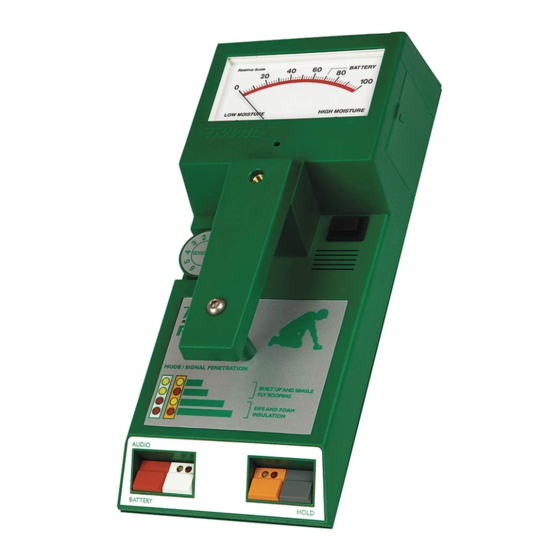Summary of Contents for TRAMEX RWS
- Page 1 Roof & Wall Moisture Scanner NON-DESTRUCTIVE MOISTURE DETECTION BUILT-UP & SINGLE PLY ROOFS EXTERIOR INSULATION FINISHING SYSTEMS (EIFS) User Guide RWSUG01/05...
- Page 2 R.W.S. User Guide TRAMEX MOISTURE/HUMIDITY INSTRUMENTS DEC SCANNER. Mobile non-destructive moisture surveying instrument for inspecting flat roofs. LEAK SEEKER. Leak tracing in flat and built-up roofing SURVEY ENCOUNTER. “State of the art” non-destructive moisture meter for measuring and recording moisture in building materials.
-
Page 3: Table Of Contents
Roof and Wall Moisture Scanner R.W.S.......4 Introduction..............4 Fig. 1. The RWS ............4 Modes Of Operation ..........5 How It Works ............5 Fig. 2. RWS Low Frequency Signals on EIFS..5 Principles Of Operation ..........6 Prior To Use.............6 Conducting A Moisture Survey ......6 OPERATION MODES ..........7 EIFS MODE ............7... -
Page 4: Roof And Wall Moisture Scanner R.w.s
EIFS (Exterior Insulation Finishing Systems). The Tramex RWS is an effective Moisture Scanner with 2 operating modes, EIFS (Walls) and Roofing, each mode has 2 ranges of sensitivity, affording you the opportunity to scan roofing, walls and the building envelope for excess moisture. -
Page 5: Modes Of Operation
R.W.S. User Guide Modes Of Operation The RWS (Roof and Wall Moisture Scanner) has two operating modes, each with two ranges of sensitivity. EIFS Mode (Yellow LED selected on MODE switch.) is for moisture scanning of exterior insulation and fin-... -
Page 6: Principles Of Operation
This change is translated by the RWS and instantly and con- tinuously displayed on the large clear analog dial which gives comparative readings of 0 to 100. -
Page 7: Operation Modes
The RWS is designed to read through electrically non- conductive materials that are positioned between the electrodes and the substrate. For example: a conductive layer with metal lath or a wet surface could give false positive readings. -
Page 8: Conducting A Moisture Survey
1” (25mm) thickness of insulation. Hold the RWS by the grab handle and place it so that electrode is in full and firm contact with the surface over a known dry area. Adjust the sen- sitivity control knob until the needle is just above zero on the analog meter. -
Page 9: Interpretation Of Readings
Professional, with insulated deep wall probes may be useful in confirming an acceptably dry area. An alternative method is to use the RWS on a seek and find basis as follows: Place the RWS against the sur- face, adjust the sensitivity control knob so that the meter reads, say 50. -
Page 10: Pin Type Resistance Meter Readings
Table 1. Comparison of RWS and Professional Pin Type Resistance Meter Readings It should be noted that calibration of the RWS in EIFS MODE was based on the averaged results of numerous on-site and laboratory tests. Therefore readings and results vary depending on construction detail and from site to site. -
Page 11: Tracing Moisture Back To Source In Eifs Or Similar Construction
In EIFS Or Similar Construction Once an area of excess moisture has been established, the RWS may be used to assist in tracing the moisture to the source of ingress as follows: Having found a wet area, turn down the SENSITIVITY knob until the needle points to approximately half scale (approx 50). -
Page 12: Conducting A Moisture Survey
See Fig 5 overleaf. 3. Proceed by moving the RWS along the imaginary line A and mark locations on the sketch graph paper and / or roof surface when moisture is indicated by... -
Page 13: Tracing A Leak And Checking Suspected Trouble Areas
Take your RWS to the general area of the roof over the leak. Switch on to activate the RWS and select the desired range. Turn the sensitivity knob to 10 and place the RWS on the roof surface. -
Page 14: Types Of Roofing Structures And Their More Common Problems
The Tramex Compact pin meter could be used to give an indication of quantative moisture content. Types Of Roofing Structures And Their More... -
Page 15: Possible Problems Leading To Moisture Intrusion Of The Roof System
Single Ply Roofing: Usually applied in welded • sheet form, direct to the insulation. Note: Using the RWS on black EPDM or Butyl rub- ber roofing may result in false readings due to the high dielectric constant of this material. -
Page 16: Correct Use Of Rws
Correct Use Of RWS. For correct use of your RWS : • Make sure that the RWS is held firmly by its built-in plastic grab handle and that your hand is not in contact with electrode or body sides of the instrument. -
Page 17: Warranty
In no event shall Tramex, its agents or distributors be liable to the customer for any special, indirect, or con- sequential loss or damage of any type whatsoever... -
Page 18: Additional Notes
R.W.S. User Guide... - Page 19 Tramex Ltd Shankill Business Centre Shankill Co. Dublin Ireland Tel: +353 1 282 3688 Fax: +353 1 282 7880 Email: sales@tramex.ie Web Site www.tramex.ie USA Tramex C/O Black Hawk Sales Inc. 28 Pin Oak Drive Littleton CO 80127 Tel: 303 972 7926...


















Need help?
Do you have a question about the RWS and is the answer not in the manual?
Questions and answers